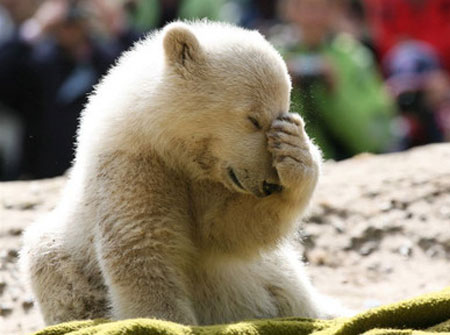Just a few days ago, one of the world’s most famous animals died. Knut was a polar bear who was born in captivity at the Berlin Zoological Garden. Rejected by his mother at birth, he was raised by zookeepers. He became a celebrity, even making it onto the cover of Vanity Fair magazine (twice, by the way – also sharing the cover with Leonardo di Caprio).
On 19 March, Knut collapsed and died in his enclosure. He was four years old. He had a seizure due to encephalitis, a swelling of the brain triggered by an infection, and collapsed into his pool where he drowned.
This story got me thinking. My understanding is that many animals exhibit a sixth sense when it comes to health and nature. They seem to be able to sense, anticipate, connect and communicate things that go beyond the ‘normal’. Knut’s mother strangely rejected both him and his brother who was born on the same day. Knut’s brother died of an infection when he was only four days old.
Could it be that Knut’s mother somehow knew that her two cubs were not “viable”? My understanding is that this may very well have been the case. In the animal world, it makes sense to abandon animals if they are not able to contribute. It takes up too many valuable resources to care for animals that will just die anyway.
I don’t know if Knut’s mother knew this. But it does provide an interesting starting point for discussions we’re going to have to have in the next decade or so.
As we continue to increase life expectancy, and as our medical and technical knowledge and expertise improves to the point where we can prolong our lives and fight off disease, we may very well reach the point of having to decide which lives are worth saving and which not. These decisions may very well relate to how we value people and their ability to contribute to society. Of course, in reality, this is happening already. Poor people have very few choices when it comes to health. Rich people can spend their wealth on prolonging their lives.
The difficulty will start in countries that have social medicine and limited budgets. At what point do we decide who can be treated (saved) and who has a disease that does not deserve treatment? When it’s public money being spent, how do we decide between one person and another? As we live ever longer, these choices will become starker.
Maybe animals like Knut’s mother do have the ability to work out quickly which of their fellows are worth saving and which not. Do we? And even if we did, should we not differentiate ourselves from the animals in some way – specifically by caring for the weak and outcast of society?
But how do we make these decisions? I think this may be one of the defining moral issues of my generation.

